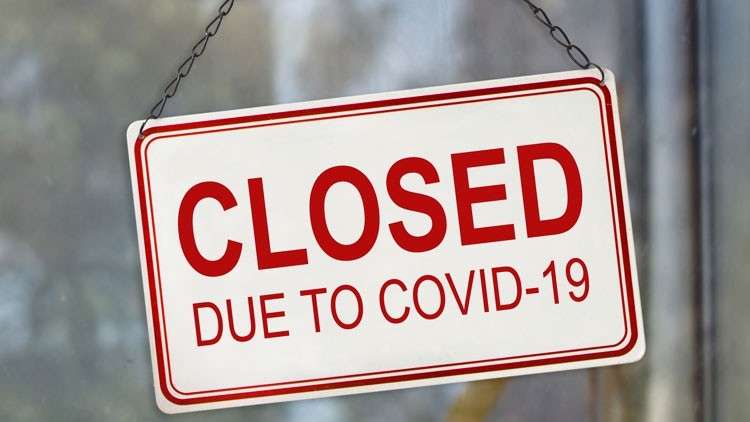Hospitality welcomes changes to Covid-19 app as 'pingdemic' forces thousands of businesses to close

Under new programming, introduced yesterday (2 August), the app will 'ping' contacts and instruct them to isolate only if they have been close to someone in the two days leading up to a positive test, rather than the current five-day threshold.
Health Secretary Sajid Javid said the change would reduce disruption, but still protect those at risk.
It comes as the so-called 'pingdemic' continues to wreck chaos across the hospitality sector, with thousands of businesses being forced to close temporarily as a result of staff having to isolate.
A survey conducted by industry body UKHospitality suggests that six in 10 hospitality businesses have had staff off work after being ‘pinged’, and that 267,000 people or 13% of the industry’s workforce have recently been, or are currently, self-isolating.
Many operators are having to take drastic measures just days after being able to trade restriction-free for the first time in 16 months, with four in 10 forced to either fully or partially close.
Others have had to take a host of steps to mitigate the problem with nearly half (47%) have reduced trading hours, and about six in 10 relying on remaining staff to work longer hours. Others have moved to limit menus (39%), and/or offer a takeaway-only service (8%).
The figures are supported by separate data from other trade bodies.
New figures from the Night Time Industries Association (NTIA) have found that 78% of night-time economy businesses lost staff to self-isolation rules in the first week following ‘Freedom Day’ on 19 July.
The survey, released before the Government announced changes to the NHS Covid-19 app, also revealed that businesses had lost 25% of their total workforce over a seven-day period, on average; and 72% of businesses now felt they would have to temporarily close parts of their operation or reduce opening hours due to shortages.
Meanwhile, according to the British Beer & Pub Association (BBPA) as many as 1,000 pubs have been forced to temporarily close due to large numbers of their staff being 'pinged' on the app and having to isolate.
Further analysis conducted by the trade association found that on average per week, being forced to close costs a pub £9,500 in trade. With pubs often having to close for two weeks, it estimates that to date the 'pingdemic' has cost the pub sector £36m in lost revenue.
“We welcome any changes to the NHS app which reduces its severity and prevents unnecessary isolation," says Emma McClarkin, chief executive of the BBPA.
“The so-called 'pingdemic' has had a huge effect on the recovery of our sector."
Test and release
There are plans to end self-isolation for the double-jabbed and under-18s from August 16 if they test negative for Covid-19, but given the sector's primarily young workforce it is likely that hospitality businesses will continue to face severe disruption for as a result of the app into the autumn.
Voices from across the hospitality sector have called on the Government to adopt a 'test and release' scheme to mitigate the impact of the 'pingdemic'.
This would enable those who are fully vaccinated to return to work having been 'pinged' if they produce a negative test result. For those not fully vaccinated, two negative tests should be considered sufficient according to UKHospitality.
“With our research showing more than 250,000 hospitality workers being affected by ‘pings’ at any given point by the NHS Covid App, this intervention from Government [to tweak the app] is absolutely necessary to prevent a complete loss of summer trading for the hospitality sector following prolonged periods of severely disrupted trading," says Kate Nicholls, UKHospitality chief executive.
“This will help to alleviate some of the pressure currently being experienced by hard-hit businesses, but is not a silver bullet.
"The fact that fully vaccinated staff will still currently have to self-isolate is a significant barrier to venues operating viably and moving towards recovery.
"We urge Government to update guidance and bring forward a workable test to release scheme at the soonest possible opportunity."
McClarkin agrees. Despite welcoming changes to the app, the BBPA says more support is still needed from Government to boost the beer and pub sector as it starts its recovery.
In line with the beer and pub sector’s Long Live The Local campaign, the trade body is urging the Government to invest in the sector through the reform of VAT, beer duty and business rates.
“If the changes to the app do not bring about the desired shift in the severity of the 'pingdemic', then the Government must explore other options. A test to release system is critical for our sector to unlock our young workforce," she says.
“On top of changes to the NHS app, more investment is needed for our sector if it is to recover and play a leading role in building back better.
"The Government must do this by reforming VAT, beer duty and business rates by which pubs and other hospitality businesses are greatly overtaxed.”














